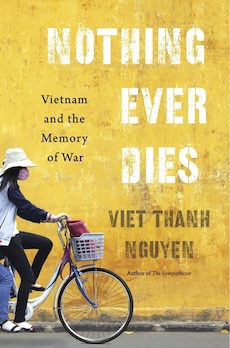By Louis J. Kern
It is a philosophical axiom that history is written by the victors. But Michel Foucault offered a more nuanced conception of history in Society Must Be Defended (1976): “War is waged throughout history, and through the history that tells the history of war . . . historical knowledge is both a description of struggles and a weapon in the struggle.” Historically, he maintained, “truth functions exclusively as a weapon that is used to win an exclusively partisan victory.”
Viet Thanh Nguyen’s book, firmly rooted in current academic interrogations of memory and identity, centers the inquiry succinctly: “all wars are fought twice, the first time on the battlefield, the second time in memory.” Focusing on the Vietnam War (the American War to the victors), he surveys the cultural and human dimensions of what is remembered and forgotten—art, literature, cinema, photographs, video games, cemeteries, museums, and monuments.
Nguyen himself is a survivor and war refugee. He was born in 1971 in Ban Me Thuot, which was seized by northern forces in March 1975. When his Catholic family fled (abandoning an adopted sister), they were consigned to the South China Sea as “boat people.” Resettled in a refugee camp in Fort Indiantown Gap, Pennsylvania, the family moved to San Jose, California, and Nguyen earned a PhD (1997) in English and ethnic studies from the University of California, Berkeley. He is currently on the faculty of the University of Southern California.
His personal experience informs his vision of conflicting memories of the war, including his own ambiguous feelings about ethnic and personal identity as graphically expressed in his Pulitzer Prize-winning novel The Sympathizer (Grove Press, 2015), which excoriated equally the victimization, terrorization, and humiliation of the peasant population resulting from the inhumanity of Americans, the Republic of Vietnam, and revolutionary Vietnamese. Nothing Ever Dies is a plea for “just memory,” i.e., the necessity to remember “enemies and victims, the weak and the forgotten, the marginalized and the minor, the women and the children, the environment and the animals, the distant and the demonized.”
Such memory that recognizes the inhumanity inherent in our humanity must be coupled with “just forgetting” that is based on forgiveness, “pure forgiveness [that necessitates] the paradox of forgiving the unforgivable.”
But both memory and forgetting are asymmetrical—nations have more control of memory than individuals, powerful nations more so than weaker ones. Hollywood, for example, has dominated international visions of the Vietnam War through the high technical quality of its productions as well as its access to worldwide distribution; Vietnam’s film industry has scarcely had an audience outside the country. While recognizing American war crimes, Hollywood has focused on their impact on soldiers and cast the Vietnamese as idealized, innocent victims. This vision ignores the victimization of peasants by the government and soldiers of both the South and the North, and fails to give agency and voice to the mass of the Vietnamese people. Museums and monuments also reflect the disparity of military/industrial power and economic resources available to a global, imperial power and a minor regional one.
Absent an ethical imagination and empathetic memory and forgetting, Nguyen argues that the prospect is a “Forever War,” a point he makes by explicit comparisons, e.g., the Con Son Prison (Hanoi Hilton) and Guantanamo, and the wars in Iraq and Afghanistan. Finally, Nguyen reaches only tentative “just forgiveness”: “I can forgive, in the abstract—America and Vietnam for what they have done in the past. But I cannot forgive them for what they do in the present because the present is not yet finished. The present, perhaps, is always unforgivable.”
Louis J. Kern (ΦBK, Clark University, 1965) is professor emeritus of history at Hofstra University. Hofstra University is home to the Omega of New York Chapter of Phi Beta Kappa.




